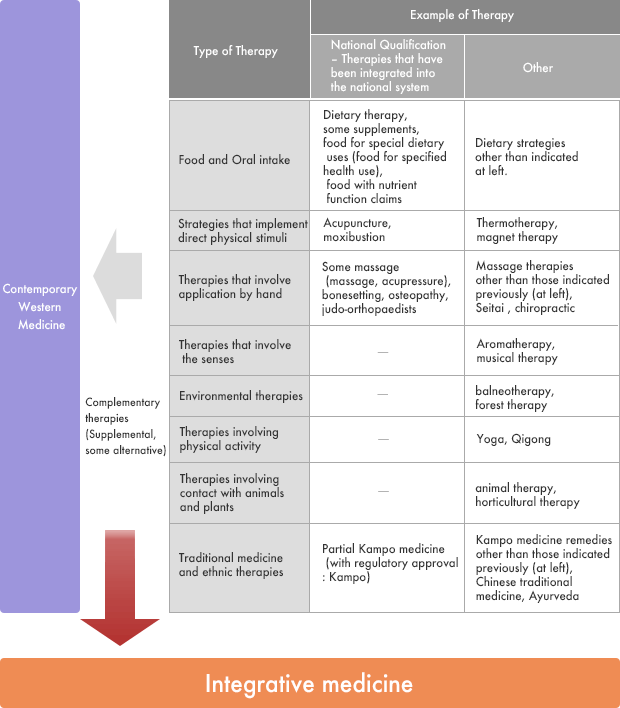What is “Integrative medicine”?
Definition of integrative medicine
Integrative medicine is a term used to cover a broad range of practices that integrate Western medicine with complementary and alternative medicine and traditional medicine.
According to The Society of Integrative Medicine Japan, “Integrative medicine is medical care that is a fusion of patient-centered practices. It widely explores not only contemporary Western medicine but also traditional medicine and complementary and alternative medicine, traditional practices as well as empirical ethnic and folk therapy.
The National Center for Complementary and Integrative Health (U.S.A.) defines that “integrative medicine” is a coordinated way of bringing together conventional and complementary and alternative approaches that have shown high quality evidence-based effectiveness and safety. Complementary and integrative medicine is defined as "a group of diverse medical and health care systems, practices, and products that are not generally considered to be part of conventional medicine". Specifically, we classify these as follows.
-
Natural Products
herbs (also known as botanicals), vitamins and minerals, probiotics, etc. -
Mind and Body Practices
yoga, chiropractic and osteopathic manipulation, meditation, massage therapy, acupuncture, relaxation techniques, tai chi, qi gong, healing touch, hypnotherapy, movement therapies, etc. -
Other Complementary Health Approaches
traditional healers, Ayurvedic medicine, traditional Chinese medicine, homeopathy, naturopathy, etc.
Source: National Center for Complementary and Integrative Health (U.S.A.) as of Mar. 16, 2017
It also should be noted that the World Health Organization (WHO) says that, “Traditional medicine is the sum total of the knowledge, skills, and practices based on the theories, beliefs, and experiences indigenous to different cultures, whether explicable or not, used in the maintenance of health as well as in the prevention, diagnosis, improvement or treatment of physical and mental illness.”
While based on the current situations, the Ministry of Health, Labour and Welfare in Japan implemented "Study Group on Concept of Integrative Medicine" in fiscal year 2012, to define integrative medicine.
They defined that "Integrative medicine, on the premises of using contemporary western medicine, is medical treatment combined with complementary and alternative medicine and traditional medicine to improve QOL (Quality of Life), led by physicians, along with, in cases, the help of a multidisciplinary team,
(See the figure below)
Therapies provided in combination with contemporary western medicine
The following table shows therapies studied by Health Labour Sciences Research Grant from their 2010 “Research on State of Information Provision of Integrative medicine.” Methods are included in the table without regard to evidence of effectiveness.

Excerpted from “Summary of Discussions to Date", Study Group on Concept of Integrative Medicine, February 2013).
Supplementary explanatory material on chinese medicine
*Currently, education on Kampo medicine is provided as a part of medical education at university level.
The Japan Society of Oriental Medicine is a special subcommittee of The Japanese Association of Medical Sciences, as well as The Japanese Society of Internal Medicine, and is establish a medical specialist system
Released: March 28, 2014
